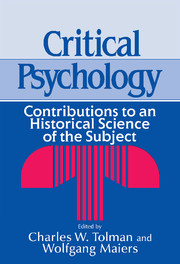Book contents
- Frontmatter
- Contents
- Preface
- Acknowledgments
- Contributors
- Critical Psychology
- 1 Critical Psychology: An Overview
- 2 Critical Psychology: Historical Background and Task
- 3 Societal and Individual Life Processes
- 4 Experience of Self and Scientific Objectivity
- 5 Psychoanalysis and Marxist Psychology
- 6 Emotion, Cognition, and Action Potence
- 7 Action Potence, Education, and Psychotherapy
- 8 Personality: Self-Actualization in Social Vacuums?
- 9 The Concept of Attitude
- 10 Client Interests and Possibilities in Psychotherapy
- 11 Play and Ontogenesis
- 12 Functions of the Private Sphere in Social Movements
- Bibliography
- Index
1 - Critical Psychology: An Overview
Published online by Cambridge University Press: 21 March 2010
- Frontmatter
- Contents
- Preface
- Acknowledgments
- Contributors
- Critical Psychology
- 1 Critical Psychology: An Overview
- 2 Critical Psychology: Historical Background and Task
- 3 Societal and Individual Life Processes
- 4 Experience of Self and Scientific Objectivity
- 5 Psychoanalysis and Marxist Psychology
- 6 Emotion, Cognition, and Action Potence
- 7 Action Potence, Education, and Psychotherapy
- 8 Personality: Self-Actualization in Social Vacuums?
- 9 The Concept of Attitude
- 10 Client Interests and Possibilities in Psychotherapy
- 11 Play and Ontogenesis
- 12 Functions of the Private Sphere in Social Movements
- Bibliography
- Index
Summary
To one degree or another a state of crisis has existed in psychology from the beginning of its existence as a separate scientific discipline in the second half of the nineteenth century. The result has been a fairly continuous flow of “crisis literature,” sometimes ebbing, sometimes flooding, but always there.
For reasons that are not hard to understand, the crisis has always been of such a nature as to reflect the relevance of psychological theory and/or practice. This is a consequence of the historical character of the discipline. No original formulation of the psychological object of investigation or of methodology can be expected to have been utterly correct and unproblematic. The problem remains the same today as in 1918 when R. S. Woodworth observed the “curious fact” about psychology, that “it is uncertain, or seems so, as to its proper line of study” (Woodworth, 1918: 20). It is certainly a sign of immaturity but, Woodworth maintained, is less serious than it at first appears. Such is the way sciences develop. Their history is one of ever more precisely identifying and approximating their “proper line of study,” including its appropriate methods.
Relevance comes into the picture as a criterion for recognizing that a “line of study” or its methods have ceased to move us ahead or are moving us in the wrong direction. It serves the same function as “satisfaction” in William James's theory of truth.
- Type
- Chapter
- Information
- Critical PsychologyContributions to an Historical Science of the Subject, pp. 1 - 22Publisher: Cambridge University PressPrint publication year: 1991
- 6
- Cited by



